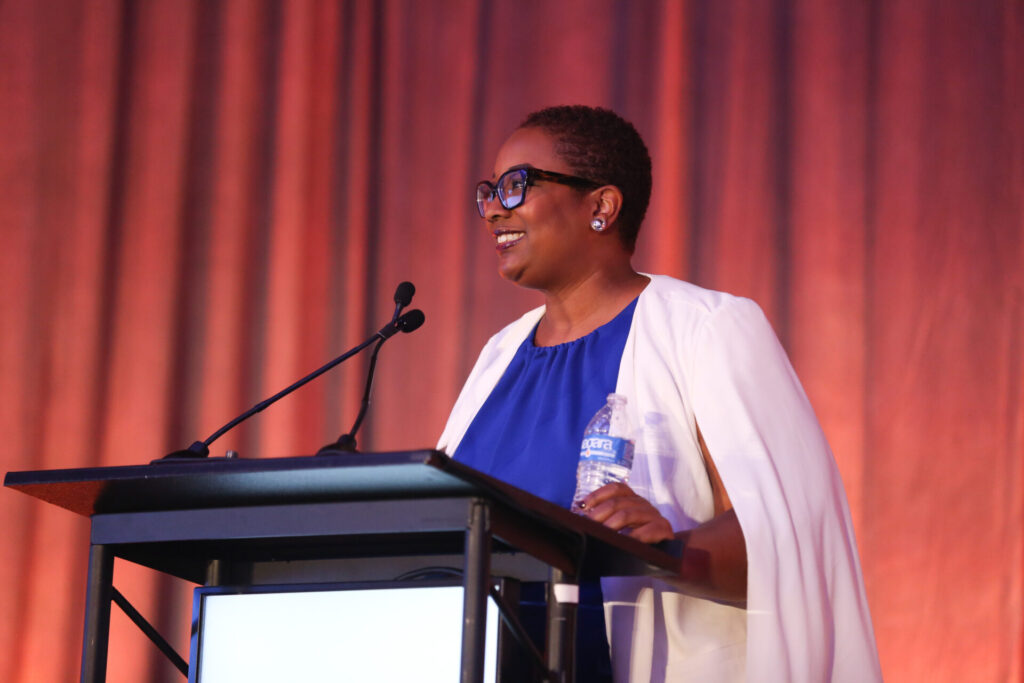COE’s Incoming President Highlights TRIO’s Resilience and Future at Annual Conference
September 12, 2023 — by Maura Casey

Despite a few headwinds this year, COE and the TRIO movement are as strong as ever.
That is the message that Kimberly Jones conveyed during the COE Update at the annual conference. Jones has served at the Council for 16 years, most recently as executive vice president. On October 1, she will assume the leadership of organization as its third president.
She reminded the audience that the year began on an optimistic note: The Biden Administration requested a funding increase for TRIO of $107 million in FY 2024.
But the celebration was short-lived. As the country was poised to hit the debt ceiling, questions emerged as to whether Congress would raise the debt limit or subject federal programs to severe funding cuts.
After months of intense negotiation, the Fiscal Responsibility Act of 2023 passed, setting spending caps for the next two fiscal years. Following passage of this bill, Congress began its work in passing its individual funding legislation. In both the House and the Senate, TRIO programs were level funded. Given the dramatic cuts to other education programs – particularly in the House – level funding was good news. “For TRIO to come out with level funding was, in this context, a victory and a testament to our work in preserving a bipartisan coalition to protect us amidst the cuts,” Jones said.
Jones reminded the audience that the organization and the TRIO movement have been here before, off and on, for more than 40 years. “We have survived the shrinking government era of the Reagan years… We survived the Bush Wars when there was an attempt to turn Talent Search and Upward Bound not once but twice into extensions of No Child Left Behind … as well as the impact of a 5 percent across-the-board cut to all programs during the Obama years.”
But, Jones stressed, the real work doesn’t happen at the COE headquarters in Washington, D.C.
“That’s the situation room,” she said. “But the real work is back home on your campuses, at your institutions, at your state and regional meetings, when you have your members come and visit, meet the students. That is how we get our TRIO champions,” Jones said.
Jones said she is looking towards the 50th anniversary of COE in eight years and seeking ways to preserve the history of the movement and absorb the lessons of those who led the way.
Following her remarks, one member of the audience asked about the recent attempts in dozens of states to ban diversity, equity, and inclusion efforts, and whether that would potentially put a target on TRIO programs. Jones emphasized that the Supreme Court decision striking down Affirmative Action only applied to the ability of colleges to weigh race as a factor in admission. But, she acknowledged, “The threats are coming. And in many cases, they are here. So, one thing we must be clear about: TRIO is a class-based program. …So, we must be mindful of how we are discussing the work we do.”
At the conclusion of the session, another audience member asked, “How can we as a community support you?” To this, Jones replied, “I need your grace…I need you all to understand that I’m not [Arnold Mitchem] or Maureen [Hoyler]. I am Kimberly Jones.”
As evidence of their support, the entire audience stood up in applause.
More News & Impact
-
Blog
Balancing Acts: 2024 Wolanin Intern and Mother of Four Recalls Her Journey to Capitol Hill
by Ni’Aisha Banks
-
Blog
Demystifying Graduate School: A Guide for First-Gen BIPOC and Nontraditional Students
by Yvette Martinez-Vu and Miroslava Chavez-Garcia
-
Blog
Empowering Excellence: A TRIO Program’s Journey to Streamlined Success with empower™
by Terrance L. Hamm
-
Blog
Unleashing the Roar: A STEAM Symposium in Celebration of the Jurassic Park 30th Anniversary
by Trauvello Stevenson
-
Blog
Breaking Barriers in Finance: The Impact of TRIO on Student Support Services Alumna Ashley Thomas
by Holly Hexter, Neve Dole
-
Blog
Research Reveals Ways to Improve Mental Health Support for First-Generation Students
by Holly Hexter
-
Blog
Mason Award and TRIO Family Award Winners Celebrate Lives Changed for the Better
by Maura Casey
-